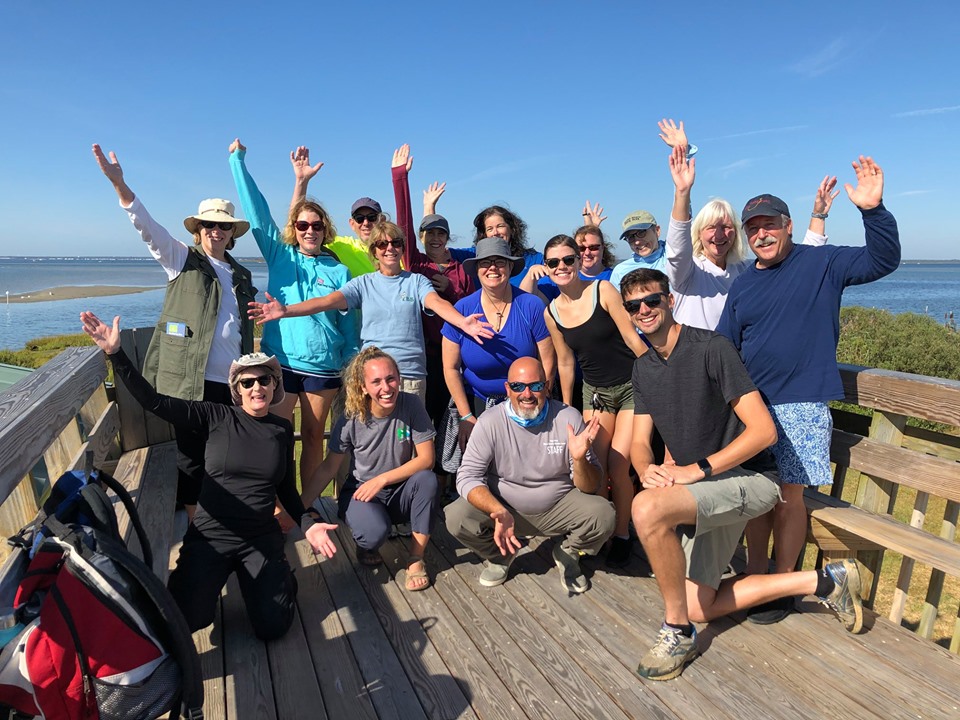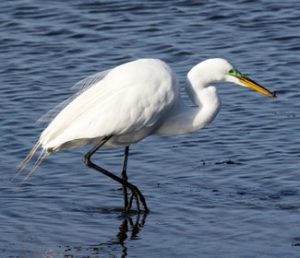
Do you enjoy learning about the plants, animals, ecology, and traditions of the Barnegat Bay and its watershed? Do you like sharing what you’ve learned with others? Then consider becoming a Barnegat Bay Volunteer Master Naturalist (BBVMN).
The Barnegat Bay Partnership offers a program to train Volunteer Master Naturalists. Participants learn about not only the wildlife and natural resources of the estuary, but also the latest scientific research and environmental challenges ahead. The program includes training in the skills and techniques volunteers use to help educate others about the bay and good stewardship of its valuable resources.
This volunteer program is based on a national model. The BBVMN training course, offered through Ocean County College, consists of both classroom and field-based learning experiences about a wide range of natural resource and wildlife topics specific to the Barnegat Bay and its watershed.

Master Naturalist Course
The course is a combination of Wednesday virtual classroom sessions and Friday field trips in May and June. Participants will learn about a wide range of wildlife and natural resource topics specific to the Barnegat Bay and its watershed. Topics include plants and animals of the bay and watershed; fishes, shellfishes, and other marine life; salt marshes, seagrasses and other important habitats; forest resources; Pine Barrens ecology; and local history, culture, and traditions. During outdoor field sessions, participants will explore both bay and upland habitats at various locations throughout Ocean County.
Registration for the 2024 Barnegat Bay Master Naturalist course is OPEN NOW!
The 2024 Schedule will occur as follows:
- Virtual Classroom Sessions: May 1, 8, 15, 22, 29 and June 5, 12, 19, 26
- In-Person Field Sessions: May 3, 10, 17, 24, 31 and June 7, 14, 21, 28
Virtual sessions run from 9:00 am to 11:00 am, and Field Trips run from 9:00am to 12:00pm. The final field trip to Sedge Island on June 28th is the exception, which will run from 9:00 am to 3:00 pm.
Course participants must have access to the internet for the virtual classroom sessions and be willing to drive to locations throughout Ocean County for the field sessions. Field trip activities will involve moderate physical activity, including hiking, kayaking, and seining in locations such as Sedge Island Natural Resource Education Center, Island Beach State Park, and Bass River State Forest to name a few. Field trips will be rain or shine, unless there is extreme weather or otherwise specified.
Once registration is completed, course participants will receive a schedule of session topics and field trip meeting locations.
Questions? Email Bailey Sanders.
Earning the Barnegat Bay Volunteer Master Naturalist Certificate
Completing the Master Naturalist course is the first step toward certification. To receive the BBVMN certificate, participants need to complete 40 hours of approved environmental service at sites within the Barnegat Bay watershed within a year of finishing the initial training course. To maintain certification, BBVMNs must complete 40 service hours plus 8 hours of advanced environmental training each calendar year.
Stay Connected
The Master Naturalists share information and stay connected on the BBP Master Naturalist Facebook page. The group is open to anyone interested in the ecology and wildlife of the Barnegat Bay watershed.
The Naturalist Newsletter
The Master Naturalists produce a quarterly newsletter, The Naturalist. Engage your interest in and passion for the natural world, read about the experiences of the Master Naturalists, and get inspired to volunteer. If you would like to be added to the email list to receive The Naturalist, contact Bailey Sanders at bsanders@ocean.edu.
Read Issues of The Naturalist
2024: Spring/Summer 2024
2023: Spring/Summer 2023; Fall 2023/Winter 2024
2022: Spring/Summer 2022; Winter 2022
2021: Spring 2021; Summer 2021; Fall 2021; Winter 2021
2020: Autumn 2020
Volunteer Opportunities
Visit the BBP Master Naturalist Facebook page for volunteer opportunities shared by the Barnegat Bay Volunteer Master Naturalists.
ASSIST WITH SCIENTIFIC RESEARCH: BBVMNs do not hesitate to get their feet wet and their hands dirty. They have assisted with seining and recording data during Barnegat Bay Partnership sea nettle research, assembling American eel collectors, and planting dune grass and maintaining trails at Island Beach State Park.
GIVE BACK THROUGH STEWARDSHIP: BBVMNs help with stewardship projects, such as dune grass plantings and trail maintenance at Island Beach State Park.
PRESENT EDUCATIONAL PROGRAMS: BBVMNs want to share what they have learned. They have led birding by kayak tours at Island Beach State Park and assisted with interpretive programs at both state and county parks and nature centers
ASSIST WITH PUBLIC OUTREACH: BBVMNs have staffed exhibits at environmental festivals and events around the watershed, such as Ocean Fun Days and Cattus Island Nature Day.
DESIGN DISPLAYS: BBVMNs have flexed their creative muscles and designed displays to educate others about the natural resources of the estuary.

